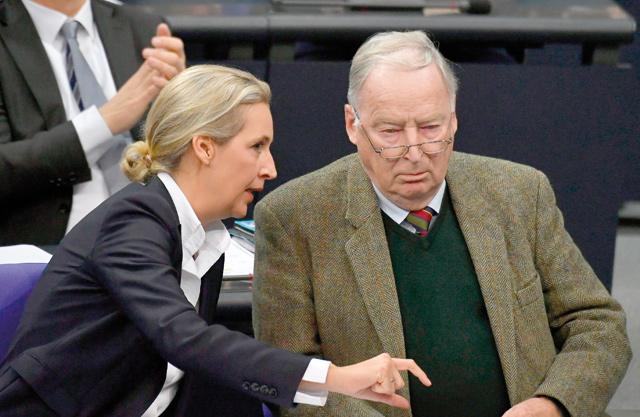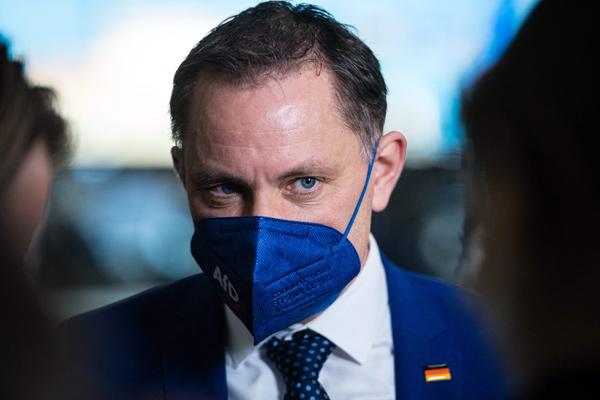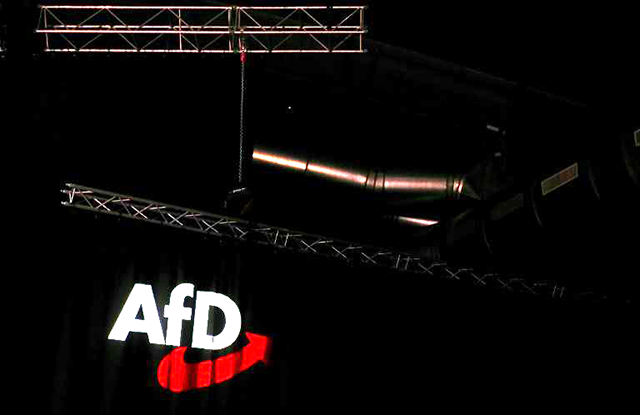You are here
Huge protests as Germany’s far-right AfD picks new leaders
By AFP - Nov 30,2019 - Last updated at Nov 30,2019
BRAUNSCHWEIG, Germany — Germany's far-right AfD Party is poised to rejuvenate its leadership on Saturday at a congress hit by massive protests, with its increasingly influential radical wing seeking to tighten its grip on the group.
The anti-migrant party's extremists have the upper hand after electoral gains in eastern regions in September and October that have caused widespread domestic and international alarm.
Illustrating the polarising effect the party has on Germany, 20,000 protesters gathered outside the congress hall in the city of Braunschweig in a noisy demonstration against what they call a racist party.
Crying "Get lost!" and "All of Germany hates the AfD", the protesters held up posters bearing slogans like "No place for Nazis" or "Stop the AfD".
The huge numbers turning up in the city "is a clear sign that no one in Braunschweig wants the AfD here," said Udo Sommerfeld, a spokesman for the anti-far-right protest.
On the eve of the congress, around a thousand protesters, all dressed in black, also marched through the centre of the city against the far-right outfit.
Wary of any negative association with the party, automaker Volkswagen, whose name is on the hall used by the AfD, has requested its logo be covered up.
Generation change
Within the hall, tensions are also running high as Alexander Gauland, 78, prepares to step down from his co-chairman role, while 58-year-old Joerg Meuthen is set to defend his seat against a challenge from party radicals.
Gauland told the party it was time to rejuvenate its leadership, saying he will "make way today for someone younger".
Bjoern Hoecke, a leading figure of the radical Fluegel ("Wing"), has not directly put forward his name for Gauland's spot.
But anyone seeking the post would need the backing of his faction, which is known for its criticism of Germany's culture of remembrance
One likely candidate who might please all sides is Tino Chrupalla, a 44-year-old MP and former house-painter from the eastern state of Saxony.
Chrupalla, who met with former Donald Trump adviser Steve Bannon in Berlin earlier this year, can count on both the support of Hoecke's Fluegel as well as of more moderate members of the party.
The AfD, established just six years ago, is riven with personal and ideological rivalries.
But Chrupalla is widely seen as the compromise candidate.
His main challenger will be Gottfried Curio, a fiery orator whose parliamentary speeches have made him a far-right social media star.
Chrupalla has presented himself as a more serious candidate, but he too has prompted outrage with his rhetoric.
Last month, he was booed in parliament after accusing Chancellor Angela Merkel of treating her voters as "underlings" with "micro-aggressions against everything German".
He has also called the "Islamisation of the West" a "reality", saying that one could qualify it as a replacement of the population.
He is seen as a representative of the former East Germany, the AfD's stronghold.
Hoecke recently described Chrupalla as "one of the AfD's great representatives in the East".
Meanwhile one Fluegel member, 49-year-old MP Nicole Hoechst, is now also planning to unseat co-leader Joerg Meuthen.
Meuthen, a university professor from western Germany, represents the more moderate wing of the party.
'Memorial of shame'
With 91 MPs, the AfD is now the third political force in the German parliament after the CDU and SPD.
But its support in opinion polls has stagnated at around 13 to 15 per cent.
The AfD started out as a eurosceptic party but became increasingly anti-migrant and opposed to Merkel's refugee policy which saw more than a million asylum-seekers arrive since 2015.
Mainstream parties have refused to work with the AfD and therefore prevented it from holding executive power on a national or regional level.
The radical Fluegel in particular has drawn scrutiny as it has attacked one of the foundation stones of Germany's post-war political culture — atonement for its Nazi past.
Hoecke notoriously described Berlin's Holocaust Memorial as a "memorial of shame", while his colleague Andreas Kalbitz has been accused of association with neo-Nazi organisations.
Related Articles
BERLIN — Germany’s far right Alternative for Germany (AfD) Party is choosing new leaders on Saturday in a vote shaped by an increasingl
DRESDEN, Germany — The far-right Alternative for Germany (AfD) will firm up its election manifesto this weekend as Germany prepares for the
BERLIN — A long simmering row between the leaders of Germany's far-right AfD Party and its radical fringe has boiled over, sapping their str














